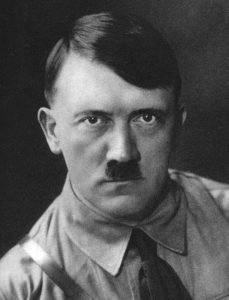Adolf Hitler (born April 20, 1889, Braunau am Inn, Austria—died April 30, 1945, Berlin, Germany) was the leader of the Nazi Party (from 1920/21) and chancellor (Kanzler) and Führer of Germany (1933–45). His worldview revolved around two concepts: territorial expansion and racial supremacy

. Those themes informed his decision to invade Poland, which marked the start of World War II, as well as the systematic killing of six million Jews and millions of others during the Holocaust.
Hitler’s father, Alois (born 1837), was illegitimate. For a time he bore his mother’s name, Schicklgruber, but by 1876 he had established his family claim to the surname Hitler. Adolf never used any other surname.
Basic Facts
- Born: April 20, 1889, in Braunau am Inn, Austria-Hungary
- Died: April 30, 1945, in Berlin, Germany (by suicide)
- Nationality: Austrian-born, later German
- Occupation: Politician, dictator, leader of the Nazi Party
Early Life
Adolf Hitler was born to Alois Hitler, a customs official, and Klara Hitler. He grew up in Austria and later moved to Germany. As a young man, he aspired to be an artist but was rejected from the Academy of Fine Arts Vienna twice. He lived in poverty for a while before joining the German army during World War I, where he served as a soldier and was wounded.
Rise to Power
After World War I, Hitler joined the German Workers’ Party, which he later transformed into the National Socialist German Workers’ Party (Nazi Party). With powerful public speaking and propaganda, he gained followers by exploiting economic hardships, national humiliation from the Treaty of Versailles, and anti-Semitic and racist ideologies.
- In 1923, he attempted a failed coup (the Beer Hall Putsch) and was imprisoned.
- While in prison, he wrote Mein Kampf (“My Struggle”), outlining his ideology and future plans for Germany.
By 1933, Hitler was appointed Chancellor of Germany, and later became dictator (Führer) after consolidating power.
World War II and the Holocaust
- In 1939, Hitler invaded Poland, triggering World War II.
- Over the next six years, Germany invaded multiple countries.
- He orchestrated the Holocaust, the state-sponsored genocide in which six million Jews, along with millions of other people (Roma, disabled individuals, political dissidents, etc.), were systematically murdered.
Death and Legacy
As Allied forces closed in on Berlin in 1945, Hitler committed suicide in his underground bunker with his wife, Eva Braun, on April 30.
His regime caused the deaths of tens of millions and left an indelible mark on world history. Hitler is widely considered one of history’s most evil and destructive leaders, and Nazi ideology is globally condemned.
Historical Impact
- Led to the creation of the United Nations
- Germany was divided post-war (East and West)
- Sparked a global conversation on human rights, genocide, and authoritarianism
Leave a Reply